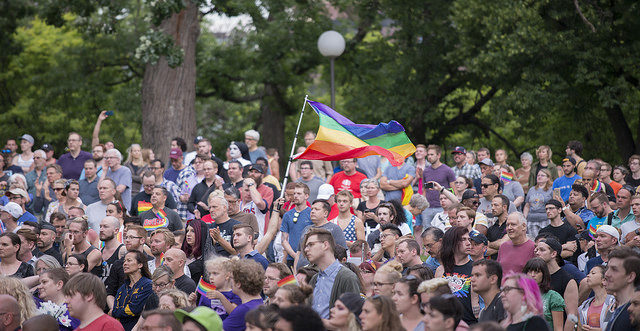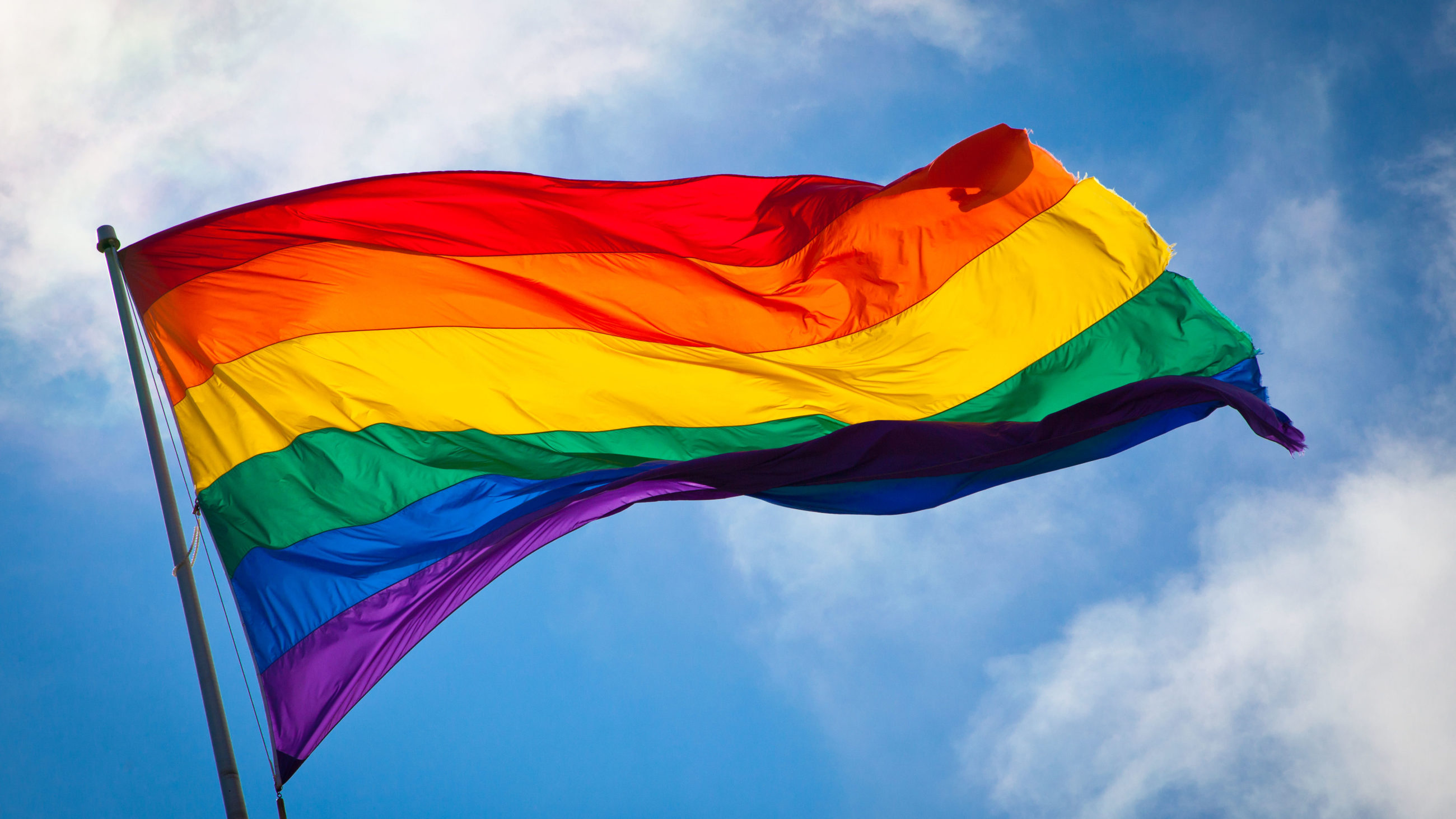After Orlando, Scientists Weigh Role of Public Policy
In the wake of the mass shooting at a gay nightclub in Orlando, Florida last Sunday, a new study suggests that policies that increase the rights of the LGBT community appear to also increase general acceptance — and could even be a tool in reducing hate crimes.
The study, just accepted into the journal Social Science Research, found that when same-sex couples gained more rights — such as marriage-equality — the number of hate crimes against them decreased. As the researchers noted, that association seems to indicate that the very fact of legal equality can influence public perception and societal norms, as evidenced by the fact that hate crimes dropped after the equality laws passed. Their conclusion was that policy itself may influence how the LGBT community is seen and treated.

A vigil in Minneapolis after the Orlando shootings is an example of just how far public opinion has come in terms of LGBT rights. But to stop hate-crimes, policy change is also needed. (Visual by Fibonacci Blue/Flickr)
“Public opinion remains pretty sharply divided [on marriage equality],” wrote Brian Levy, a Ph.D. student at the University of North Carolina and lead author on the paper, in an email. “As the reaction to Orlando highlights, however, public opinion isn’t divided on hate crimes. So, if pro-equality policies are related to reductions in hate crimes, that offers a broadly-popular rationale for those policies and is an argument that’s less commonly made right now.”
In the study, the researchers looked at the number of laws protecting LGBT communities across the U.S. from 2000 to 2012, and compared that with the number of hate crimes based on sexual-orientation, which the FBI lists as one of the top reasons for hate crimes in the country. The study found that when a new law that protected LGBT rights — including those that grant full marriage equality, rights to a marriage-like union, or some spousal rights — was passed, hate crimes went down.
For instance, the analysis found that in 2000, one in six Americans lived in a state with hate crime protection laws that included sexual orientation and there were 4.8 of those crimes per million people. By 2005, seven in ten people were covered by those laws, and this type of hate crime had decreased by 27 percent, to 3.5 per million people. Using the the FBI’s hate crime statistics for 2014 as an example, this drop would represent 336 out of 1,248 hate crimes.
Though the reasoning for these declines is not fully understood, Levy says his best guess is that the “policies can either legitimize or delegitimize social stigmatization of the LGBT community and thus impact the number of hate crimes that occur.”
Not, he emphasizes, that research shows that better policies could have prevented what happened in Orlando, or any particular hate crime. Levy’s study looks at general trends, not single incidences. “It’s tough to isolate any one specific hate crime and say what could have been done to prevent it,” Levy said.
There is some indication that restricting rights can have a negative effect. In an earlier study in 2008, researchers examined hate crimes based on sexual orientation, and the effect of the Defense of Marriage Act. After DOMA — which defined marriage under federal law as being between one man and one woman — was passed in 1996, there was a leap in the percentage of hate crimes due to the victim’s sexual orientation, even as the total number of hate crimes dropped nationally.
While DOMA was a step back for LGBT rights, the researchers also examined the effect of specific state equality laws that appeared to exert some protective effect. After Vermont’s decision in 2000 to allow same-sex couples to enter civil unions, hate crimes there based on sexual orientation dropped from nine in 2000 to five in 2004. In Massachusetts, there was a similar result after a 2003 ruling that declared same-sex marriages could not be denied in the state. Hate crimes based on sexual orientation went from 96 in 2002 to 66 in 2004.
By contrast, Florida’s government has strongly resisted allowing same-sex unions in the state, even after the U.S. Supreme Court ruled them legal. This March — only three months ago — a U.S. District Court struck down a state ban on gay marriage. The state’s defense of the ban was so strident — arguing in court that gay marriage would cause “significant public harm” — that, after the Orlando shootings, CNN’s Anderson Cooper raised the issue of state prejudice against gays in a widely-publicized interview.
And Florida isn’t the only state that’s been resistant to LGBT equality laws. North Carolina notably passed a law that restricts transgender people to using the bathroom that corresponds with the sex on their birth certificate. According to gay activists, some 150 state ordinances putting limits on LGBT rights are also now under consideration across the country and Congress is considering legislation that would allow businesses to refuse service to same-sex couples.
It’s one reason that researchers are studying the impact of such policies, although most agree that more work needs to be done to fully tease out their effects. Donald Green, a professor of political science at Columbia University, says the early indications are that legal-equality may be a powerful tool when it becomes a bigger part of public conversation.
“I’m not sure if the ordinary American knows if he or she lives in a state with hate crime laws, and public officials rarely use the term,” Green said. “The question would be, if the point of these laws is to express in an authoritative way official norms, how is the message getting through if they are so seldom discussed?”
Jo Michael, the Legislative Manager of Equality California pointed out that the Orlando shooting didn’t just affect the gay community, but the gay community of color. The LGBT community is of course not the only minority group affected by hate crimes, but Levy said he doesn’t know if there is a similar correlation between public policy and hate crimes against other minorities. It is also unclear, at least from his study, how much the drop in hate crimes against one-minority might affect the hate crimes against another.
And Levy said once hate crime statistics for 2016 are available, he hopes to look at how the relationship between hate crimes and policy has changed even more recently. “I’m not sure how likely it would be, but tolerance could have spillover benefits,” he said.”And that would be interesting.”











Comments are automatically closed one year after article publication. Archived comments are below.
Major problem with this theory. Hate crime reporting is spotty at best. See AP investigation earlier this month:
http://bigstory.ap.org/article/8247a1d2f76b4baea2a121186dedf768/ap-patchy-reporting-undercuts-national-hate-crimes-count
The AP examined FBI hate crime reports for the years 2009 through 2014 and matched those against lists of every city and county law enforcement agency in each state, obtained separately from all 50 states.
An analysis revealed that law enforcement reporting is spotty even beyond the more than 2,700 agencies that never filed even a single hate crime report. For example, thousands of city police and county sheriff’s departments — which handle the vast majority of local law enforcement responses and investigations — reported in some years but not others. And, in some cases, departments reported for, say, only one quarter of a year without submitting reports covering the rest of that span.
That’s a very fair point, Seth, and very nice AP work. But it’s also true that we have to work – until we do better – with the available data and the apparent association between extending LGBT rights – or denying them – and hate crime statistics appears pretty damn interesting. It’s exactly the kind of research that we should illuminate in the interest of continuing conversation into these kinds of issues.